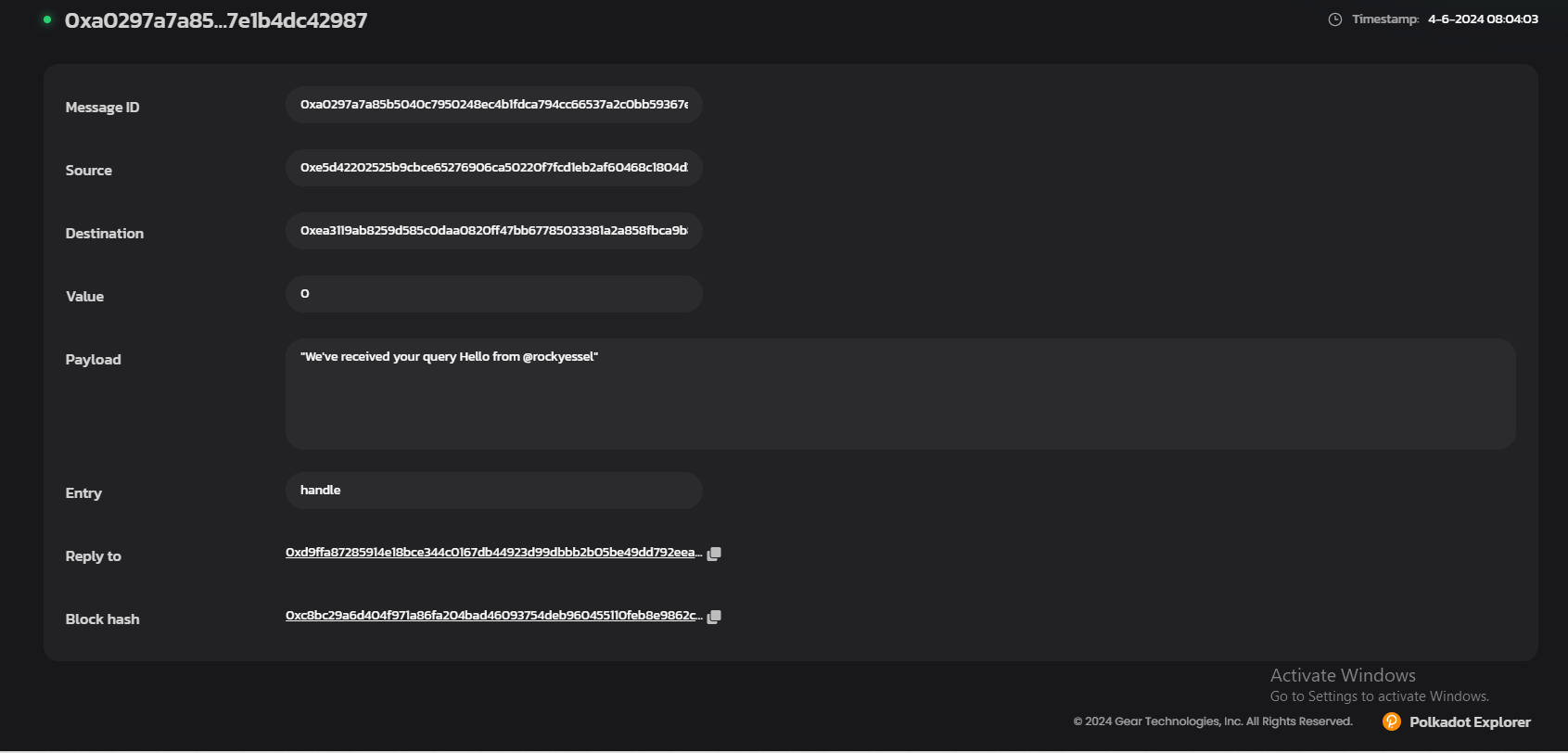
Next Project - input-msg
Next Project - input-msg 관련
Just like the illustration earlier, you're going to interact with your program by sending an input value to your smart contract deployed on IDEA. IDEA is your deployment environment where you deploy your smart contract on the Vara Network.
The point here is for you to load input values from your user, and process it by concatenating a string to the user's input value: "We've received your query. {user's-input}".
This is the reply you'll send back to the user that sends a message (input value).
So in your freecodecamp-gear-protocol directory, run the command below to add another member to your freecodecamp-gear-protocol/Cargo.toml.
cargo new --lib input-msg
After adding another member or project in the freecodecamp-gear-protocol, your path should be freecodecamp-gear-protocol/input-msg.
Earlier, I made mention of how to access input values into the smart contract or program by using gstd, which has a function or method called load(). For the next step, clear your freecodecamp-gear-protocol/input-msg/src/lib.rs, and paste the following code and run cargo check.
#![no_std]
use gstd::{msg, prelude::*};
#[no_mangle]
extern "C" fn handle() {
let new_msg = msg::load().expect("Unable to create string");
let reply_msg = format!("We've received your query {}", new_msg);
msg::reply_bytes(reply_msg, 0).expect("Unable to reply.");
}
The check fails, but why? Well, the load() function has a type of unknown. And since Rust is a strongly typed language, it has to always know the type before hand, which wasn't the case, so it failed to build the project.
This should tell you that the load() doesn't have a type, and it is up to you to set the right data type, and failure to do so would result in some frustrating errors like below.
Debugging
Now if you were to use a single project and not a workspace, then debugging the error might have easy like below.
error[E0282]: type annotations needed
--> C:\Users\user\Desktop\2024\web3\re-gear\input-msg\src\lib.rs:7:9
|
7 | let new_msg = msg::load().expect("Unable to create string");
| ^^^^^^^
|
help: consider giving `new_msg` an explicit type
|
7 | let new_msg: /* Type */ = msg::load().expect("Unable to create string");
| ++++++++++++
But since you and I are using a workspace, it makes debugging a little difficult. This is my error message i got, when dubgging this error.
error[E0275]: overflow evaluating the requirement `gstd::parity_scale_codec::Compact<_>: gstd::Decode`
|
= help: consider increasing the recursion limit by adding a `#![recursion_limit = "256"]` attribute to your crate (`input_msg`)
= note: required for `gstd::parity_scale_codec::Compact<_>` to implement `gstd::Decode`
= note: 125 redundant requirements hidden
= note: required for `gstd::parity_scale_codec::Compact<<_ as CompactAs>::As>` to implement `gstd::Decode`
For more information about this error, try `rustc --explain E0275`.
error: could not compile `input-msg` (lib) due to 1 previous error
warning: build failed, waiting for other jobs to finish...
error: cargo command run failed: exit status: 101
warning: build failed, waiting for other jobs to finish...
And if you look closely, you can tell that the input-msg is what creating the error. In this case, run rustc --explain E0275, which output an suggestion like this
An evaluation of a trait requirement overflowed.
Erroneous code example:
trait Foo {}
struct Bar<T>(T);
impl<T> Foo for T where Bar<T>: Foo {}
This error occurs when there was a recursive trait requirement that overflowed before it could be
evaluated. This often means that there is an unbounded recursion in resolving some type bounds.
To determine if a T is Foo, we need to check if Bar<T> is Foo. However, to do this check, we need to
determine that Bar<Bar<T>> is Foo. To determine this, we check if Bar<Bar<Bar<T>>> is Foo, and so on. This
is clearly a recursive requirement that can't be resolved directly.
Consider changing your trait bounds so that they're less self-referential.
Now, though, compared to the first error message, this message doesn't provide a direct solution, it does tells you that, there's a type error in your code. And the reason is that, the load() can load any data type, so you should always defined a type for it.
#![no_std]
use gstd::{msg, prelude::*};
#[no_mangle]
extern "C" fn handle() {
let new_msg: String = msg::load().expect("Unable to create string");
let reply_msg = format!("We've received your query {}", new_msg);
msg::reply_bytes(reply_msg, 0).expect("Unable to reply.");
}
In the above code, you've added a type String to the new_msg because that's the type you're expecting. Now run the build command, and deploy the file .opt.wasm to IDEA.
.freecodecamp-gear-protocol
├── receive-joke
├── Cargo.toml
├── input-msg
│ └── ...
└── target
├── ...
└── wasm32-unknown-unknown
├── ...
└── release
├── input_msg.opt.wasm <--- Optimized for deployment.
├── input_msg.wasm
├── receive_joke.opt.wasm
└── receive_joke.wasm
When you're done, go to your program and click on the Send Messages. Type any value into the payload field, and it should be a type of String.
Submit and approve and head back to your program, then select your reply_message box and you should see your reply message.
